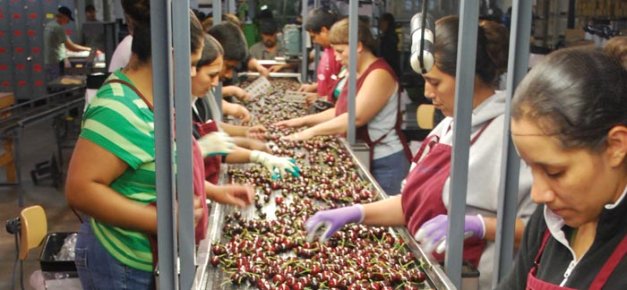
Gordon Goodwin’s cherry orchard at Stemilt Hill, near Wenatchee, Washington, is in one of Washington’s later cherry districts. So, as he’s updated his orchard over the past 30 years, he’s focused on varieties that he can harvest well after the midseason glut: Bing, Sonata, Selah, Lapins, and Attika.
About eight years ago, he was ready to harvest a block of Sonata when he noticed that on one tree, the cherries were far from ripe. “I thought it was sick,” he said. “Everything else was ripe, and they were little green cherries.”
Each year, the fruit on that one tree ripened weeks after the rest of the fruit had been picked. Goodwin became convinced it must be a different variety. He called Van Well Nursery, which had supplied the Sonata trees, and asked them to take budwood from that tree and propagate more for him.
Fred Valentine, horticulturist for Van Well Nursery, said he didn’t think the new tree was either of the late-maturing varieties Staccato or Sweetheart, either. It matures even later than Sweetheart.
Goodwin, who is also pastor of the nondenominational Stemilt Hill Community Church, said he prayed about the tree and knew that if it was going to be a successful variety, it had to be big, sweet, and firm. The cherry has a long stem and unique flavor, he said.
When DNA tests at Washington State University confirmed that it was not a known variety, Goodwin promptly named it Glory. “God gave me the tree; God gets the Glory,” he reasoned.
Over the past two years, he has planted more Glory trees on Gisela 6 and Mazzard rootstocks and has grafted over a block of Bing on G.5 rootstocks. His son-in-law Eric Erb has also planted the variety in his orchard at Malaga.
Last year, he picked his first commercial crop of 2.5 tons of Glories on August 16. His son-in-law also had 1.5 tons. Columbia Fruit Packers, which had shut down its cherry line and was gearing up to pack apples, ran the Glories over its Rainier line. More than 70 percent of the cherries were 9.5 row and larger, and the firmness was exceptionally high at 308 grams per millimeter, even without a gibberellic acid treatment, Goodwin said.
Pete Van Well at Van Well Nursery said the cherry is probably an open-pollinated seedling of Sonata. He described it as a large, black cherry with high soluble solids. It also appears to withstand cold spring weather better than some other varieties, though it blooms at the same time as Bing. After a spring frost at Erb’s orchard last year, Glory trees had twice as many live buds as Skeena and Bing. It is self-fertile.
The variety is being patented and will be licensed to Van Well Nursery, which will have trees available in the spring of 2013.

Leave A Comment